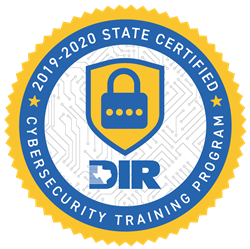
Government organizations really need this type of training to build up their human firewall, which will help to protect them against the ongoing problem of social engineering. -Stu Sjouwerman, CEO, KnowBe4
TAMPA BAY, Fla. (PRWEB)
November 05, 2019
KnowBe4, the provider of the world’s largest security awareness training and simulated phishing platform, today announced that it is now certified by the Texas Department of Information Resources for state and local government employees in Texas.
House Bill 3834 (86R) was created to require that state and local government employees take mandatory cybersecurity training to help better protect the government. It requires that the Texas Department of Information Resources, in consultation with the Texas Cybersecurity Council, certify cybersecurity training programs for state and local government employees. KnowBe4 has been selected to be certified. The course requirements include a focus on information security habits and procedures that protect information resources and teach best practices for detecting, assessing, reporting and addressing information security threats.
“We’re excited for the opportunity to bring our security awareness training and simulated phishing to more of the government employees who work for the state of Texas,” said Stu Sjouwerman, CEO, KnowBe4. “State and local governments have been making headlines recently due to an onslaught of ransomware attacks. Government organizations really need this type of training to build up their human firewall, which will help to protect them against the ongoing problem of social engineering.”
An organization can measure its Phish-proneTM Percentage, which indicates how many of their employees are likely to fall for a phishing or social engineering scam, to evaluate the security mindset of its employees. Every organization regardless of size and vertical is susceptible to phishing and social engineering without computer-based training. The average initial baseline Phish-prone Percentage is around 30% and after one year of testing and simulated phishing, drops down to just 2%.
For more information on KnowBe4, visit http://www.knowbe4.com.
Share article on social media or email:

